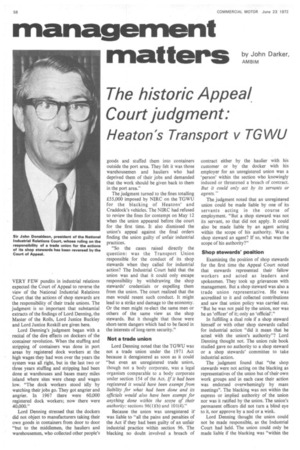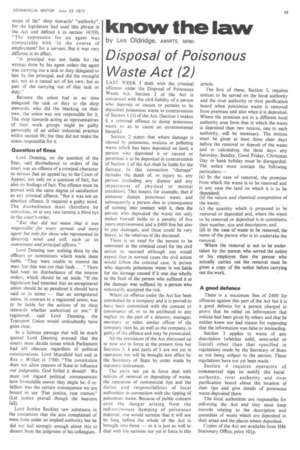management matters
Page 58

Page 59

If you've noticed an error in this article please click here to report it so we can fix it.
The historic Appeal Court judgment:
Heaton's Transport v TGWU
VERY FEW pundits in industrial relations expected the Court of Appeal to reverse the view of the National Industrial Relations Court that the actions of shop stewards are the responsibility of their trade unions. The judgment is so important that substantial extracts of the findings of Lord Denning, the Master of the Rolls, Lord Justice Buckley and Lord Justice Roskill are given here.
Lord Denning's judgment began with a recital of the dire effects on dockers of the container revolution. When the stuffing and stripping of containers was done in port areas by registered dock workers at the high wages they had won over the years the system was all right, but in the last two or three years stuffing and stripping had been done at warehouses and bases many miles inland where sites were cheap and wages low. "The dock workers stood idly by watching their jobs go. They got angrier and angrier. In 1967 there were 60,000 registered dock workers; now there were 40,000."
Lord Denning stressed that the dockers did not object to manufacturers taking their own goods in containers from door to door "but to the middlemen, the hauliers and warehousemen, who collected other people's goods and stuffed them into containers outside the port area. They felt it was those warehousemen and hauliers who had deprived them of their jobs and demanded that the work should be given back to them in the port area."
The judgment turned to the fines totalling £55,000 imposed by NIRC on the TGWU for the blacking of Heatons' and Craddock's vehicles. The NIRC had refused to review the fines for contempt on May 12 when the union appeared before the court for the first time. It also dismissed the union's appeal against the final orders finding the union guilty of unfair industrial practices.
"So the cases raised directly the question: was the Transport Union responsible for the conduct of its shop stewards when they called for industrial action? The Industrial Court held that the union was and that it could only escape responsibility by withdrawing the shop stewards' credentials or expelling them from the union. The court realized that the men would resent such conduct. It might lead to a strike and damage to the economy. Or the men might re-elect the same men or others of the same view as the shop stewards. But it thought that those were short-term dangers which had to be faced in the interests of long-term security."
Not a trade union Lord Denning noted that the TGWU was not a trade union under the 1971 Act because it deregistered as soon as it could "but even an unregistered trade union, though not a body corporate, was a legal organism comparable to a body corporate under section 154 of the Act. If it had been registered it would have been exempt from liability for what had been done and its officials would also have been exempt for anything done within the scope of their authority: sections 96(1)(b) and 101(4)."
Because the union was unregistered itwas liable to "all the pains and penalties of the Act if they had been guilty of an unfair industrial practice within section 96. The blacking no doubt involved a breach of
contract either by the haulier with his customer or by the docker with his employer for an unregistered union was a 'person' within the section who knowingly induced or threatened a breach of contract. But it could only act by its servants or agents."
The judgment noted that an unregistered union could be made liable by one of its servants acting in the course of employment. "But a shop steward was not its servant, so that did not apply. It could also be made liable by an agent acting within the scope of his authority. Was a shop steward an agent? If so, what was the scope of his authority?"
Shop stewards' position Examining the position of shop stewards for the first time the Appeal Court noted that stewards represented their fellow workers and acted as leaders and spokesmen. They took up grievances with management. But a shop steward was also a trade union representative. He was accredited to it and collected contributions and saw that union policy was carried out. "But he was not paid by the union, nor was he an 'officer' of it; only an 'official."
In fulfilling a dual role if a shop steward himself or with other shop stewards called for industrial action "did it mean that he acted with the union's authority"? Lord Denning thought not. The union rule book studied gave no authority to a shop steward or a shop stewards' committee to take industrial action.
The judgment found that "the shop stewards were not acting on the blacking as representatives of the union but of their own work groups and in each case their action was endorsed overwhemingly by mass meetings". The blacking was not within the express or implied authority of the union nor was it ratified by the union. The union's permanent officers did not turn a blind eye to it, nor approve by a nod or a wink.
Lord Denning thought the union could not be made responsible, as the Industrial Court had held. The union could only be made liable if the blacking was "within the scope of the" shop stewards' "authority", for the legislature had used this phrase in the Act and defined it in section 167(9). "The expression for an agent was comparable with 'in the course of employment' for a servant. But it was very different in its effect.
"A principal was not liable for the wrongs done by his agent unless the agent was carrying out a task or duty delegated to him by the principal, and did the wrongful act, not as a casual act of his own, but as part of the carrying out of that task or duty.
Because the union had at no time delegated the task or duty to the shop stewards, who did the blacking on their own, the union was not responsible for it. The shop stewards acting as representatives of their work groups might be guilty personally of an unfair industrial practice within section 96; but they did not make the union responsible for it.
Question of fines
Lord Denning, on the question of the fines, said disobedience to orders of the court was an offence of a criminal character so serious that an appeal lay to the Court of Appeal, not only on a question of fact, but also on findings of fact. The offence must be proved with the same degree of satisfaction as any criminal offence. "But it was not an absolute offence. It required a guilty mind. The disobedience must therefore be conscious, or at any rate turning a blind eye to the court's order.
"But that did not mean that it was responsible for every servant and every agent but only for those who represented its directing mind and will, such as its committees and principal officers."
Lord Denning saw nothing done by the officers or committees which made them liable. "They were unable to control the men, but that was not their fault...." There had been no disobedience of the interim orders, which should be set aside. "If the legislature had intended that an unregistered union should be so penalized it should have said so in terms — that an unregistered union, in contrast to a registered union, was to be liable for the actions of its shop stewards whether authorized or not." If registered, said Lord Denning, the Transport Union would undoubtedly have gone clear.
In a famous passage that will be much quoted Lord Denning stressed that the courts must decide issues which Parliament had left obscure regardless of political considerations. Lord Mansfield had said in Rex v. Wilkes in 1700: "The constitution does not allow reasons of State to influence our judgments. God forbid it should! We must not regard political consequences: how formidable soever they might be: if rebellion was the certain consequence we are bound to say 'Fiat justitia, ruat coelum" (Let justice prevail though the heavens fall).
Lord Justice Buckley saw substance in the contention that the acts complained of were done under an implied authority but he did not feel strongly enough about this to dissent from the judgment of his colleagues.












































































































